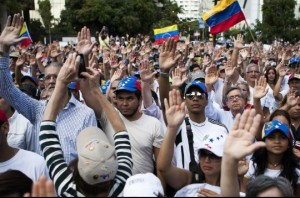Anton Moggré
UCR Class of 2015
On February 12, 2014, Venezuela’s national youth day,  thousands of Venezuelan students and members of the opposition occupied the streets to reclaim justice and democracy, as well as respect for freedom, security and transparency. Subsequently, military and police forces violently intervened, leading to the death of six students and dozens of wounded. Protests have persisted as criticism of the oppressive government inevitably boiled over.
thousands of Venezuelan students and members of the opposition occupied the streets to reclaim justice and democracy, as well as respect for freedom, security and transparency. Subsequently, military and police forces violently intervened, leading to the death of six students and dozens of wounded. Protests have persisted as criticism of the oppressive government inevitably boiled over.
Currently, the country is governed by President Nicolás Maduro, the successor of Hugo Chávez. On Wednesday, February 19, Maduro decided to take the leader of the opposition, Leonaldo López, into custody. The basis for this decision can at best be described as “ambiguous”, at worst oppressive.
Unfortunately, state media has not reported on the growing unrest, and the few privately owned media outlets have been shut down and exiled. Besides the lack of information from the media, social media has faced constant censure. These media platforms are the only means of communication that can be used by the protestors, and therefore invaluable. The last sources of information to be blocked were the Colombian news outlets, such as TNT24, which have now stopped being broadcast in Venezuela.
So what has happened in Venezuela? The formerly enthusiastic ‘Chavista’ supporters, whose goal was to achieve ‘Socialism in the 21st Century´, have turned against their government. One reason for the change in tide could be the clear lack of leading qualities and qualification embodied by the new president, Maduro. The former bus driver, who did not complete high school, lacks the charisma of his predecessor and has therefore been unable to bolster support. Whereas Chávez was the leading force behind the Bolivian Revolution, founded the socialist Venezuela, and nationalized the oil industry. Chávez was adept at hiding real problems, such as the insecurity, corruption, food shortages and economic recession facing Venezuela, by using rhetoric and state media to portray an idyll and strong nation. Despite the many problems, the Chavez supporters remained galvanized and enthusiastic about their leader’s accomplishments. As a result of Chávez supporter’s positive perception of their deceased leader, he has become a national legend in the eyes of many Venezuelans.
Secondly, it has become clear that Chávez’s revolution has resulted in failure. Although poverty and inequality rates have been decreased, this can better be considered as a redistribution of wealth, not because of an increase of revenue within Venezuela. Furthermore, public institutions have failed to provide adequate services in any sector. For instance, there are no public or private hospitals or universities in Venezuela that have ranked in the top twenty of Latin-America.
The economy is characterized by high inflation and shrinking economy growth rates. On top of these phenomena, the foundation of investment and social policies in Venezuela, oil, has decreased in price. As a result of the nationalization of many private sector industries, there has been massive emigration of the upper class to other places in the region, further resulting in the diminishing of the economy. Monetary issues have also become a problem, as strict currency controls were implemented in 2003 to prevent capital flight, which has resulted in currency devaluations. Furthermore, corruption can be considered as rampant and present at every level in society, hence further obstructing any form of progress.
Thirdly, due to the oppressive attitude of the government towards the private sector, basic products such as flour, bread, meat, toilet paper etc. have been scarce in supermarkets for months and due to rigid price controls, excessively expensive. To remedy this problem, Venezuelans have been flying to Colombia or Miami to buy basic necessities and import them themselves, such as toilet paper. The heavily subsidized and nationalized agricultural sector’s unproductivity has created a dependence on foreign imports which is often left unfulfilled.
Fourthly, crime is devastating Venezuela’s society. With almost 25,000 homicides in 2013, for a population of 30 million people, crime has become an ever-present threat to the life of all Venezuelans. Issues such as kidnappings, extortion and robbery have remained unsolvable, as the government is incapable and unwilling to solve these issues, as they are very susceptible to bribes and in some cases also the perpetrators. Some Venezuelan police, military and other government officials have strong bonds with Colombian and Mexican drug cartels, which has only aggravated the problem. Besides the ineffective protection of persons, justice has remained unserved in that over 90% of crimes remain unpunished.
In conclusion, it is evident that the Venezuelan people, especially the academic people and the middle class, will continue their protest against the repressive Maduro regime. Despite recent events, Maduro still enjoys the backing of many Chávez supporters. This demographic is typically poor and also known for their unyielding faith in Chávez’s chosen one. This fissure makes it difficult to predict the outcome of the protest. The one thing that remains certain is that the demonstrations will persist, making their outcome both relevant to Venezuelans and the world at large.
Anton Moggré, class of 2015, is a Law major from Utrecht, the Netherlands.
